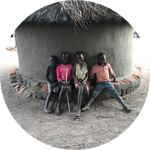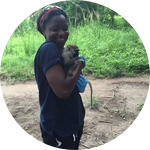About This Project
Sub-saharan Africa accounts for >70% of the global HIV/AIDS burden (AVERT, 2016). In Nigeria, 1 in 4 new cases are diagnosed in women, particularly adolescent and young adults. The current project aims to understand the extent of health literacy and how literacy can be improved among females. Currently, health literacy/education is not a priority for schools. This intervention will focus primarily on education & female empowerment.
Ask the Scientists
Join The DiscussionWhat is the context of this research?
In understanding the HIV epidemic in sub-Saharan Africa, it is important to note that the nature of the disease varies by continent. There are several factors that facilitates transmission among adolescents and young women including lack of access to education, limited health services, violence, lack of power to negotiate condom use, and burden of care for HIV-infected family members (Joint UN Program on HIV/AIDS, 2014). Simbayi et al. (2005) found that among South African youths, general knowledge of HIV transmission was high; however, misconceptions about HIV/AIDS were still persistent, especially with regard to HIV transmission.
What is the significance of this project?
This study aims to determine the adequate level of resources needed, feasibility of the proposed intervention, and solidification of the intervention for study outcomes. The feasibility component of the intervention is critical in obtaining continued support from the community. It will also serve as a guide in scaling up the intervention to other schools in the region. The results of this pilot study will provide valuable insights for formulating appropriate Intervention strategies, as well as financial support for the larger study.
What are the goals of the project?
25 schoolgirls and 25 university-aged young adults will experience a comprehensive approach to sexual health education, which is often missing in Nigerian schools. A pre-test will be administered to assess the baseline knowledge of safe sexual health behaviors, and the transmission mode of STD. The specific outcomes to be evaluated include knowledge, attitude, beliefs of risky sexual behaviors, improved knowledge of STI services in the community, availability of strong social ties in cases of emergencies, increased condom use, and or delay in first sexual intercourse. We will also assess the number of times students encountered risky situations and how equipped they were handle it. The ultimate goal of this assessment is to inform future health education courses in Nigerian schools.
Budget
It is important to compensate the key students at the pilot school and university in Nigeria since they will be acting as project champions at their pilot institutions. Retaining participants is critical for the success of this study.
Also, it is important to have highly trained facilitators. Travel compensation for the facilitators, as well as, cost of time is included in our budget. This project will collaborate with the institutions to access key individuals. It is necessary to pay participants for their time. This project will provide the schoolgirls $10 for the baseline assessment, and $30 to come back for the final follow-up assessment. On the other hand, the university girls will be provided $20 for the baseline assessment, and $40 for the final follow-up assessment. The institutions will also provide the space for training.
The success of this pilot will inform expansion to other schools and universities.
Endorsed by
Meet the Team
Team Bio
We are a group of individuals who are both personally and professionally invested in improving the lives of young women in Nigeria, one project at a time. Combined, we have extensive experience in research and program implementation to see this project through.
Omobola Mudasiru
As an adjunct faculty at University of North Texas Health Science Center, I have extensive research and practice experience in infectious disease surveillance. My research interest is in global health, particularly infectious diseases surveillance and prevention. I have been a part of several qualitative analysis examining access to health services amongst people living with HIV/AIDS. This proposal support further prevention efforts and it aligns well with my passion for global health and disease prevention in Africa, especially my home country, Nigeria.
Chika Nwachukwu
I am a medical resident at Stanford University. My particular interests are in global oncology and the growing burden of cancers in LMICs, particularly, in the application of innovative ways to prevent, manage and treat. I have extensive research experience in cancers that disproportionately affect patients of African descent and I am passionate about tackling the growing cancer burden from unique perspectives. Majority of the cancer burden in LMICs are caused by infections and are therefore preventable at best and curable at worst. This proposal supports the prevention of cancers that are linked HIV and infectious in Africa through education.
Project Backers
- 32Backers
- 111%Funded
- $3,351Total Donations
- $101.55Average Donation


